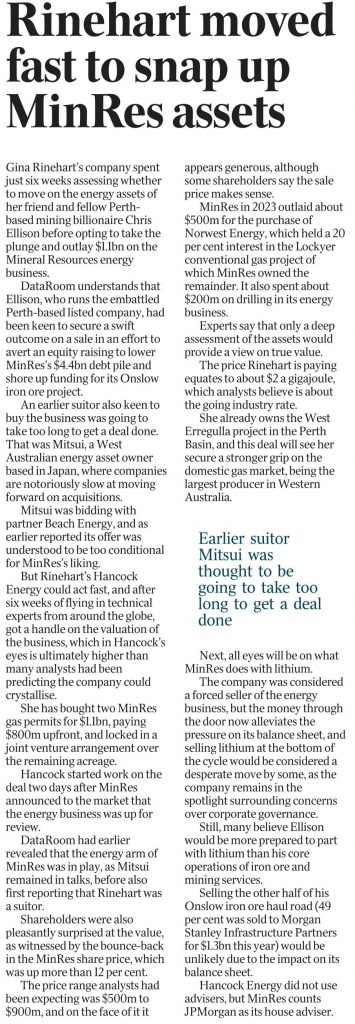
Article by Bridget Carter, courtesy of The Australian.
The company of Gina Rinehart spent a speedy six weeks assessing whether to move on the energy assets of her friend and fellow Perth-based mining billionaire Chris Ellison before opting to take the plunge and outlay $1.1bn on the Mineral Resources energy business.
DataRoom understands that Mr Ellison, who runs the embattled Perth-based listed company, had been keen to secure a swift outcome on a sale in an effort to avert an equity raising to lower Mineral Resources’ $4.4bn net debt level and shore up funding for its Onslow iron ore project.
And an earlier suitor keen to buy the business was going to take too long to get a deal done.
That was Mitsui, a WA energy asset owner that is from Japan, where companies are notoriously slow at moving forward on acquisitions.
It was bidding with partner Beach Energy, and as earlier reported, its offer was understood to be too conditional for Mineral Resources’ liking.
But Mrs Rinehart’s Hancock Energy could act fast, and after six weeks of flying in many technical experts from around the globe, got a handle on the valuation of the business, which in Hancock’s eyes is ultimately higher than many analysts had been predicting the company could crystallise.
She has bought two Mineral Resources gas permits for $1.1bn, paying $800m up front, and locked in a joint venture arrangement over the remaining acreage.
Hancock started work on the deal two days after Mineral Resources announced to the market that the energy business was up for review.
DataRoom had earlier revealed that the energy arm of Mineral Resources was in play, as Mitsui remained in talks with the company, before also first reporting that Mrs Rinehart was a suitor.
Shareholders were also pleasantly surprised at the value, as witnessed by the bounce-back in the Mineral Resources share price, up more than 12 per cent.
The range analysts had been expecting was between $500m and $900m, and on the face of it, it appears generous, although some shareholders say that on reflection, the sale price made sense.
Mineral Resources in 2023 outlaid about $500m for the purchase of Norwest Energy, which held a 20 per cent interest in the Lockyer conventional gas project of which Mineral Resources owned the remainder. It also spent about $200m on drilling in its energy business.
Experts say that only a deep assessment of the assets would provide a view on true value.
What Mrs Rinehart is paying equates to about $2 a gigajoule, which analysts believe is about the going industry rate.
She already owns the West Erregulla project in the Perth Basin, and this deal will see her secure a stronger grip on the Australian domestic gas market, being the largest producer in Western Australia.
Next, all eyes will be on what Mineral Resources does with lithium.
Mineral Resources was considered a forced seller on the energy business, but the money through the door now alleviates the pressure on its balance sheet, and selling lithium at the bottom of the cycle is considered a desperate move by some, as the company remains in the spotlight surrounding concerns over corporate governance.
Still, many believe that lithium would be a unit of Mineral Resources Mr Ellison would be more prepared to part with than his core operations of iron ore and mining services.
Selling the other half of his Onslow iron ore haul road (49 per cent was sold to Morgan Stanley Infrastructure Partners for $1.3bn this year) would be unlikely due to the impact on its balance sheet.
Hancock Energy did not use investment banking advisers, but Mineral Resources counts JPMorgan as its house adviser.
















